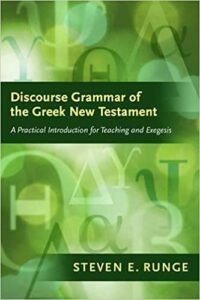Lesson 22: The Present Middle and Passive is now up and running. It has exercises for recognizing both Ω conjugation and ΜΙ conjugation verbs as well as several vocabulary exercises.
Exercises for Lesson 21
I have added six short exercises to lesson 21: More on the Aorist Middle and Passive. The exercises provide practice recognizing the aorist middle/passive forms of the following six verbs:
If you learn the aorist middle/passive forms of these six verbs you will be able to recognize the aorist middle and passive forms of all verbs in the New Testament.
Additions to Lesson 20
I’ve added a couple of new exercises to lesson 20: one for practice recognizing 1st aorist middle forms, and one for recognizing 2nd aorist middle forms.
Updates to Lesson 19: Semantic Roles and Voice
I have added three drag-and-drop vocabulary exercises and a vocabulary practice quiz to lesson 19: Semantic Roles and Voice.
Lesson 19: Vocabulary Flash Cards
I’ve added a vocabulary flash card exercise to lesson 19: Semantic Roles and Voice, the Aorist Passive. More to come over the next few days.
Drag and Drop Vocabulary (Lesson 17)
I’ve replaced the Drag and Drop Vocabulary exercise for lesson 17 with two shorter ones. Some browsers had trouble handling 17 drag and drop items in a single file, so I pared it down to two files with 8 and 9 words respectively.
Vocabulary Flash Cards for Lesson 17
I just added a vocabulary flash card exercise to lesson 17. As with other lessons, the flash card exercise is located at the end of the lesson, after the reading and translation exercise.
Lesson 17: Present Tense Review and Expansion
I have added three new exercises to lesson 17. Enjoy.
Καλὰ Χριστούγεννα (Merry Christmas in Greek)
I wish you all a wonderful Christmas.
The folks over at Omniglot.com provided a recording of the phrase in the title of this post that was used here from 2010 to 2015. My link to that recording ceased to function this year, so I replaced it with a recording of my own. Click the triangle below if you want to learn to say “Merry Christmas” in Hellenistic Greek.
| New audio added November 25, 2016 |
|---|
| m4a
AAC mp3 |
Thanks to Omniglot.com for providing the audio that was used in this post from 2010 to 2015!
| A note on pronunciation added in 2014: |
|---|
| The pronunciation from Ominiglot.com was done using Modern Greek pronunciation. While there are several important differences between Modern Greek and the way the language was spoken in the Hellenistic Period (Koine), none of those differences impact the pronunciation of καλὰ Χριστούγεννα. Of course at the time of Jesus and Paul no one would have said καλὰ Χριστούγεννα since Christmas was not yet celebrated. When it did come to be celebrated, though, early Christians would have pronounced this phrase the same as it is pronounced today in Greece. |
| A note on spelling (Added 12/15/2015) | |
|---|---|
| There is one small difference in spelling of the Christmas greeting between 300 CE and the present: the system of written accents has been simplified. Contrast the following spellings. Can you see the difference? | |
| Modern: | Καλά Χριστούγεννα |
| Hellenistic: | Καλὰ Χριστούγεννα |
Discourse Grammar of the Greek New Testament
 A few weeks ago, Mike Aubrey announced on ΕΝ ΕΦΕΣΩ the release of Steve Runge’s new book, Discourse Grammar of New Testament Greek. To see the announcement, visit his blog at ΕΝ ΕΦΕΣΩ.
A few weeks ago, Mike Aubrey announced on ΕΝ ΕΦΕΣΩ the release of Steve Runge’s new book, Discourse Grammar of New Testament Greek. To see the announcement, visit his blog at ΕΝ ΕΦΕΣΩ.
This is a ground-breaking work, in that it approaches grammar from a linguistic perspective not previously employed in a full grammar of Biblical Greek. Notice the subtitle: A Practical Introduction for Teaching and Exegesis.
